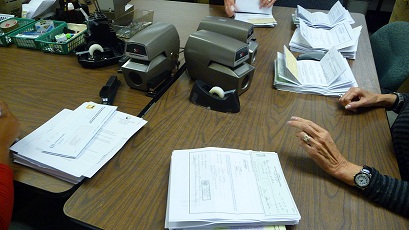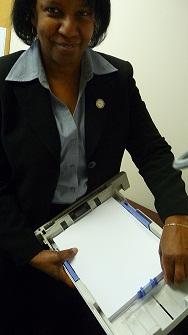Georgia Not Verifying Required “Secure and Verifiable” Citizenship Documents

Jim Burress / WABE News
Georgia’s new immigration law, “HB-87,” is meant to make it harder for undocumented workers to stay in the state.
But a provision in the law requiring everyone who seeks a professional license to prove citizenship or legal residency is causing problems both for professionals and the agencies that license them.
Consider nurses alone.
So far this year, 600 have lost their licenses said Georgia Deputy Secretary of State Kelly Farr.
Some just haven’t provided proof of citizenship or legal working status, but Farr said most are falling through the cracks because his office can’t keep up with the workload.
“There’s nothing more frustrating than getting that call from the desperate nurse, knowing that she’s being slowed down because we literally don’t have enough people to click the approve button,” Farr said.
At the Secretary of State’s license processing office in Macon, four employees sit around a table, opening endless stacks of mail, removing staples, and pushing documents through an antiquated timestamp machine.
“The fee, a transcript, test scores, whatever it is—if we get all of that information on the front end, then we can issue the license and that’s a done-deal,” explained manager Lisa Durden of the license processing office. 
And until this year, that was the norm.
But with the law’s new documentation requirements, every application takes just a bit longer to process; many take a lot more time.
Despite the increased workload, state budget cuts have left this office with 40% fewer people.
LaSharn Hughes , executive director of the Georgia Composite Medical Board, tells a similar story. Her office licenses physicians and about a half-dozen other medical practitioners.
She says processing delays and confusion about the new requirements mean about 5% of licenses have lapsed. That’s some 1,300 doctors, physician assistants, and other medical practitioners.
“We didn’t have the staff. We didn’t have the equipment to manage all of that,” Hughes said.
The Composite Medical Board is catching up though, she said. 
According to Medical Association of Georgia executive director Donald Palmisano Jr., he didn’t see the bill having any effect on the state’s physicians.
The new document requirements came as a surprise.
“We did monitor the bill. We did not see any direct impact at the time on physicians in terms of their licenses,” he said.
Plus, Palmisano said, it fixes a problem that never existed among Georgia’s doctors.
“We’re not aware of any undocumented immigrants that are physicians.”
That’s what frustrates Dr. Jorge Simmonds-Diaz, a Columbian-born physician who immigrated here 35 years ago.
He’s already complied with the document requirement, and said the process wasn’t hard. Still, he questioned why this added step to prove something he’s already proven multiple times.
“These questions, they have been asked to us as a foreign medical graduate so many times,” Simmonds-Diaz said.
Decades ago, Simmonds-Diaz’s Georgia medical license was held up until he could provide a high school transcript from Columbia. In English. He said that makes more sense than stopping a qualified physician from working.
Dr. Joanne Schulte, an Atlanta pediatrician, also questioned the wisdom behind the law.
“I honestly wonder how the rules for this process were made,” she said. ”It just does not seem particularly well thought out to me, and I’m sure it’s going to make some people pretty angry.”
One of those angered is D.A. King. Easily Georgia’s most outspoken critic on illegal immigration, he helped write the law.
“I am not only outraged, but sincerely disappointed and puzzled that our repair legislation was not allowed a vote last year,” King said.
A widely supported bill that fixed some of the previous law’s shortcomings died in the last legislative session.
Still, King stands behind the law.
“We are simply trying to safeguard the rights of lawfully present people in Georgia and make Georgia as inhospitable as possible to people who are here in violation to federal immigration law.”
Republican State Representative Matt Ramsey sponsored HB 87. He did not respond to numerous requests for comment. Gov. Deal, who signed the bill into law, also never responded to WABE’s calls.
Until a fix comes, state licensing offices will continue opening mail full of copies of passports and birth certificates, then checking them against a list of acceptable documents.
But that’s where the process ends, confirmed Dept. Secretary of State Kelly Farr.
Despite the law requiring “secure and verifiable” documents, it says nothing about making sure the documents are genuine.
“There’s no way to do that,” Farr said.
So far, the new requirements have uncovered no illegal immigrants, state officials said.
Instead, they hope the process itself is enough to discourage people in the country illegally from trying to get a license in the first place.
[This story is part of a reporting partnership that includes WABE, NPR and Kaiser Health News. A similar version aired on NPR’s All Things Considered.]
9(MDAxODM0MDY4MDEyMTY4NDA3MzI3YjkzMw004))





